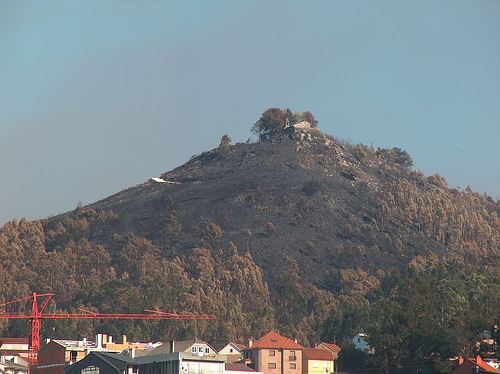One company from Granada (South of Spain) has developed a product that eliminates the use of bacteria in a few months the pollutants produced in the soil after combustion caused a forest fire.
As reported, See Foundation, in a statement, the main novelty is that the solution is based on bacteria that degrade toxic compounds and allow the growth of new vegetation in a few months.
The product is an outcome of the European project "Bacsin", that the company Bio-Ilíberes (from Granada), linked to the Council for Scientific Research (CSIC), has developed in collaboration with 16 research teams from 9 different countries.
The team selected species of bacteria capable of degrading the resulting compounds after combustion caused a fire and, between them, which stimulate the regeneration of vegetation regrowth from seeds or trees.

"Monte quemado en Arcade", Arcade, Vigo, Galicia, North of Spain, by Contando Estrelas, at flickr.com
Once selected bacteria, applied bioinformatics and metagenomics tools to study the behavior of bacterial populations in the field itself, without isolating them in the laboratory.
According to project leader, Matilde Fernandez, the value of it is that they have taken knowledge of classical microbiology novel tools to analyze the degradation of contaminants "in situ".
In this way,they have applied the data obtained in laboratory tests using specific bioinformatics field to see how they behave in reality.
Experts have specifically applied a mixture selected seeds and bacteria in the laboratory before in an experimental plot of the mountains of Malaga.
This application process designed by the company called "rizorremediación" has been removed soil contaminants in a few months.
In addition, the mountain vegetation recovers more quickly, reducing the visual impact and prevents erosion by water.
So far, for soil remediation destroyed by fire using chemical or physical processes "in situ" that cause costly environmental impact.
However, the product created using a bacterial consortium of eight bacteria that "eat" contaminants because they use as a source of energy for survival, which also makes it a sustainable process.
Kind regards,
Luis
Sponsored by Costaluz Lawyers.
(Click down) :
.jpg)